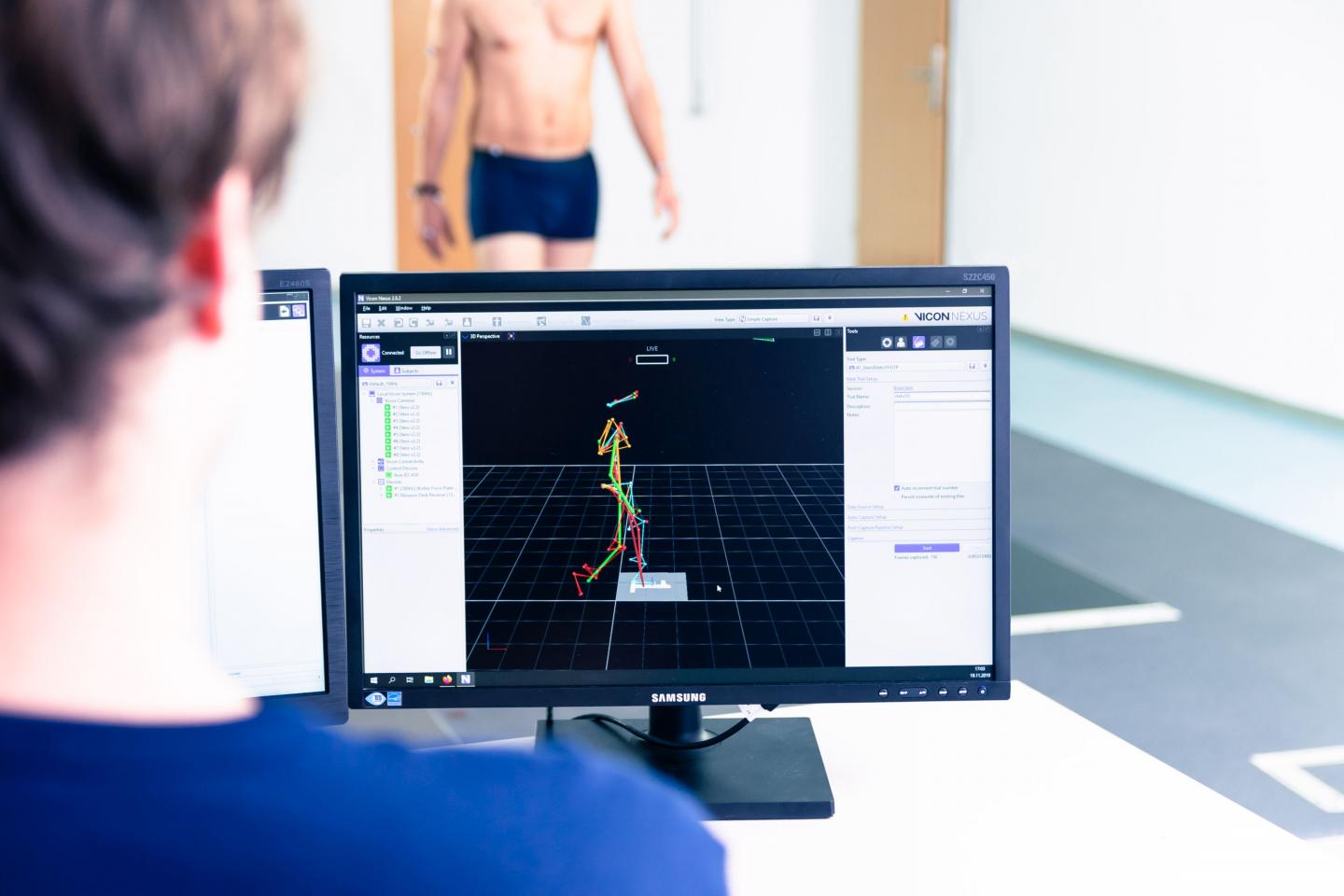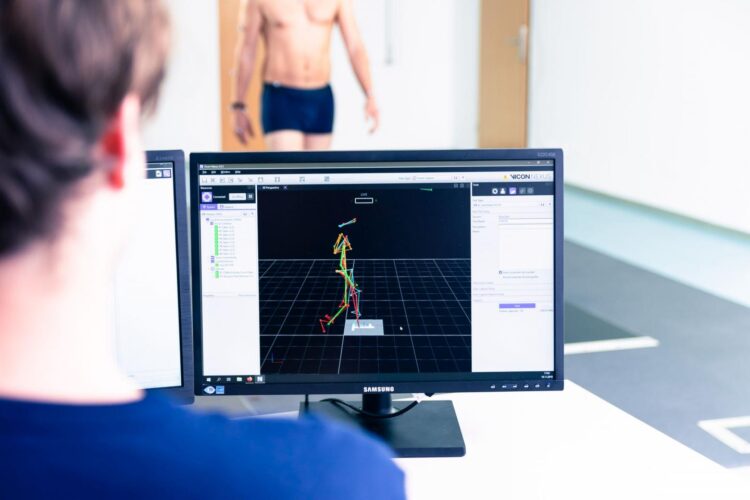One of the biggest data records for automated gait analysis worldwide openly accessible

Credit: FH St. Pölten / Florian Kibler
The database comprises information on the so-called “ground reaction force” (GRF) which is the force between the foot and the ground that is generated during movement. It is an important standard parameter used in clinical practice and in research. The figures form the basis for diagnosis and for the assessment of therapeutic success.
“Gait analysis provides a huge amount of data. Their interpretation is challenging and there is a great deal of interest in supporting medical decision-making processes with machine learning methods. The more data we have, the better the results”, explains Brian Horsak, head of the research focus Motor Rehabilitation at the St. Pölten UAS.
Anonymised Data of More than 2,000 Patients
In order to facilitate research, therapy and diagnosis, Brian Horsak and his colleagues at the St. Pölten UAS and the AUVA have now published one of the biggest data records worldwide on this topic in anonymised form. The data include anonymised information on more than 2,000 patients after joint transplantations, fractures and ligament injuries as well as associated impairments of the hips, knees, ankles and heel bones.
The data come from several years of clinical gait analysis practice and can be used to improve analysis procedures and models. The database called “GAITREC” is available online free of charge.
“We have processed and published the data together with the AUVA. In times of the coronavirus, this dataset is even more interesting as many experts are unable to collect data in the lab and therefore have to rely on existing data records. Our dataset can be of assistance here, in terms of both teaching and research”, emphasises Djordje Slijepčevi?, co-author of “GaitRec” and machine learning expert at the St. Pölten UAS.
Research Focus Motor Rehabilitation
The research focus Motor Rehabilitation at the St. Pölten UAS develops technology-assisted approaches to physical rehabilitation and promotes their widespread application in clinical practice through collaborations with partners. Within the framework of this research focus, the St. Pölten UAS and the AUVA have been carrying out joint research projects for years.
These last couple of years, the St. Pölten UAS has expanded its competencies in the fields of motor rehabilitation, instrumented 3D gait and movement analysis, machine learning, visual analytics, and augmented & virtual reality, and anchored them on location in the Center for Digital Health Innovation (CDHI). With the Digital Health Lab, the UAS has one of the most modern research labs in Austria in these fields.
The technical advancements in the aforementioned areas open up new and innovative treatment options in physical rehabilitation far beyond the existing approaches. The described works on the GAITREC database were partly funded by NÖ Forschungs- und Bildungsges.m.b.H. (NFB) and the department of science and research of the Lower Austrian state government.
###
Publication “GaiTRec, a Large-Scale Ground Reaction Force Dataset of Healthy and Impaired Gait”
Brian Horsak, Djordje Slijepcevic, Anna-Maria Raberger, Caterine Schwab, Marianne Worisch, Matthias Zeppelzauer
Link to paper: https:/
https:/
Link to Dataset:
https:/
Research Focus Motor Rehabilitation at the St. Pölten UAS
https:/
Digital Health Lab at the St. Pölten UAS
https:/
Center for Digital Health Innovation (CDHI) at the St. Pölten UAS
https:/
About the St. Pölten University of Applied Sciences
The St. Pölten UAS is a provider of performance-oriented university education with a strong practical relevance in the six areas of Media & Economics, Media & Digital Technologies, Computer Science & Security, Rail Technology & Mobility, Health Sciences, and Social Sciences. Today the university has approximately 3,400 students in 25 study programmes and numerous further education programmes. In addition to education, the St. Pölten UAS engages in intensive research. It carries out scientific work in the aforementioned areas by adopting a cross-institutional and interdisciplinary approach. The study programmes maintain a constant dialogue with the institutes which continuously develop and implement application-oriented research projects with a strong practical focus.
About the AUVA and the Rehabilitation Centre Weißer Hof
The Austrian insurance institution AUVA is the social accident insurance fund for more than five million people. It offers all services covered by statutory accident insurance including rehabilitation. The rehabilitation facilities of the AUVA treat patients after accidents resulting in functional limitations of the locomotor and support systems, following amputations, paraplegia and craniocerebral trauma.
http://rzweisserhof.
Contact for Further Information and Queries:
Mag. Mark Hammer
Section Head Press
Marketing and Communications
T: +43/2742/313 228 269
M:+43/676/847 228 269
E: [email protected]
I: https:/
Press releases and photos are available for download at https:/
General press photos are available for download at https:/
The St. Pölten UAS expressly states that it holds all rights of use pertaining to the attached photographs. The recipient of this message is authorised to use the attached photos only in connection with the press release and with reference to the St. Pölten UAS and the copyright holder. Any other use of the attached photographs requires the express written approval of the St. Pölten UAS (e-mail is sufficient).
Of course, you can also find us on Facebook and Twitter:
http://www.
Media Contact
Mark Hammer
[email protected]
Original Source
https:/
Related Journal Article
http://dx.





